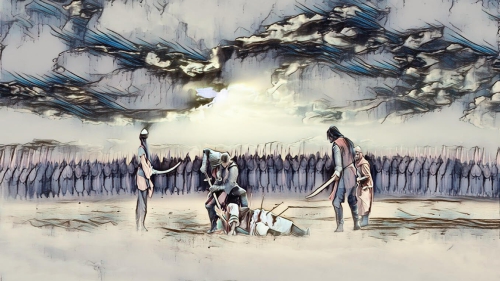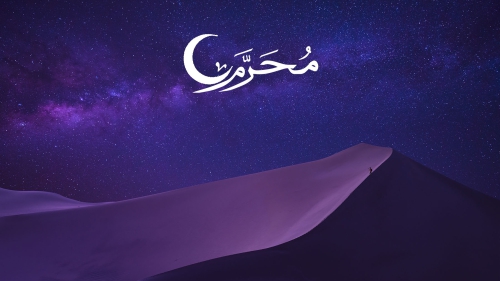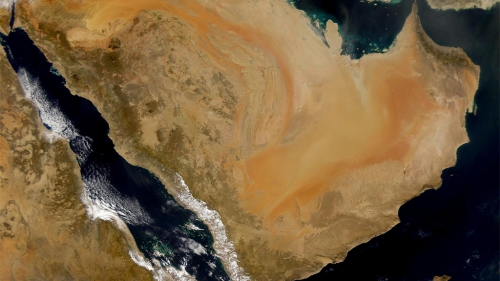Omar Ibn Said: Autobiography of a Muslim Slave
-
Judy Woodruff:
A one-of-a-kind manuscript written by a slave has now been preserved in the Library of Congress.
The Arabic-language autobiography spent decades in private collections, before the library acquired it in 2017. Now it has been digitized for the world to read.
And Amna Nawaz reports on the manuscript's remarkable for our ongoing arts and culture series, Canvas.
-
Amna Nawaz:
Born and raised in West Africa, Omar Ibn Said was 37 years old when he was kidnapped and taken to America as a slave in the 1800s.
-
Narrator:
"Before I came to the Christian country, my religion was the religion of Mohammed."
-
Amna Nawaz:
His autobiography, in his native language of Arabic, is believed to be one of the only one of its kind, the original words of a Muslim American slave.
-
Narrator:
"Then there came to our place a large army, who killed many men, and took me, and brought me to the great sea."
-
Ala Alryyes:
His literacy and culture completely goes against, abolishes, one might say annihilates, the narrative that slaves were not capable of culture. In fact, they were persons with distinct histories, abilities, culture, and background.
-
Amna Nawaz:
Ala Alryyes has studied and translated the words of Omar Ibn Said.
-
Narrator:
"They sold me into the hands of the Christians, who bound me and sent me on board a great ship, and we sailed upon the great sea a month-and-a-half, when we came to a place called Charleston."
-
Mary-Jane Deeb:
He was wealthy. And he was highly educated, because, in his autobiography, he speaks about spending 25 years studying.
-
Amna Nawaz:
Mary-Jane Deeb is the chief of the African and Middle East Division at the Library of Congress, where Ibn Said's manuscript now lives.
-
Mary-Jane Deeb:
So there was a man who was caught at the age of 37, and shipped off to South Carolina, in a country he doesn't know, among a people whose language he doesn't know.
-
Amna Nawaz:
Ibn Said wrote he was sold to a — quote — "small, weak, and wicked man" called Johnson. After years of abuse, he fled, but was caught in North Carolina.
-
Ala Alryyes:
He is then captured and brought to a jail cell, and he begins to write on the walls of his jail cell in Arabic. So, that attracted the attention of pretty important people, because the man who ends up buying him and releasing him from jail was the brother of the governor of North Carolina.
-
Amna Nawaz:
Over time, Ibn Said converted to Christianity. In his 60s, he writes his own story, but only in Arabic.
-
Ala Alryyes:
It's written in Arabic. And so his masters could not really read it at all. They could not try to influence its writing. And so it was really his exact words, unfiltered by the machinery of the editorship of masters and abolitionists, as other slave narratives were.
-
Amna Nawaz:
A machinery Alryyes says erased countless narratives, including the fact that up to 20 percent of Africans enslaved in America were Muslim.
Ibn Said, in fact, chose to open his autobiography with a verse from the Koran.
-
Ala Alryyes:
The crux of this Koranic chapter is that it's only God who has the possession and the ownership, both of human beings and of things. And, therefore, it seems to me kind of a hidden text. What Omar is saying is that, you guys have no right to own me here.
-
Mary-Jane Deeb:
It's a narrative that challenges the original concept of who the slaves were when they came here, that they didn't really have a system of belief, they were uncultured, they didn't have a written system.
This is what he brings to the table, and basically says that is who we really are.
-
Amna Nawaz:
But before those pages written by Omar Ibn Said could be shared with the rest of the world, conservators here at the Library of Congress worked for months behind the scenes to bring those pages back to life.
-
Sylvia Albro:
We're trying to present the item as close to what it looked like at the time as possible.
-
Amna Nawaz:
Sylvia Albro led the effort to rescue the nearly 200-year-old manuscript. The materials themselves, she says, tell us even more about the life of Omar Ibn Said.
-
Sylvia Albro:
It's actually surprising that the quality of paper for his manuscript is really pretty good. The fact that he had at his disposal good-quality materials is an indication of the respect that he had as a figure, even as a slave.
-
Amna Nawaz:
That respect brought Ibn Said to the attention of prominent abolitionists, missionaries and linguists at the time, who translated his story and used it in their fight against slavery.
The entire manuscript is now available online for a new generation to read Ibn Said's words for themselves.
For the "PBS NewsHour," I'm Amna Nawaz in Washington, D.C.
-
Judy Woodruff:
And what a gift it is to all of us.
( Source: PBS NewsHour )
READ: The U.S. Library of Congress - Omar Ibn Said Collection
Topics: American Muslims, History, Library Of Congress, Slavery In The United States
Views: 4418
Related Suggestions

















